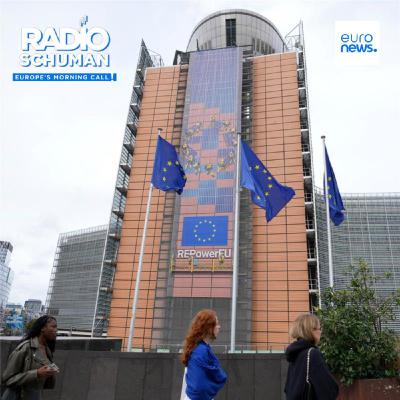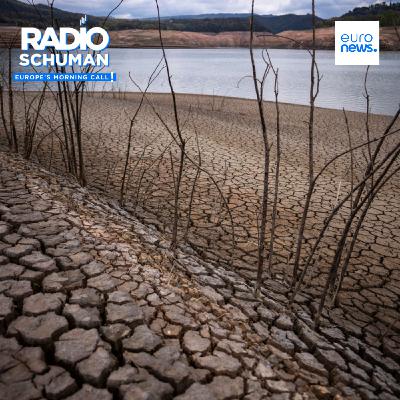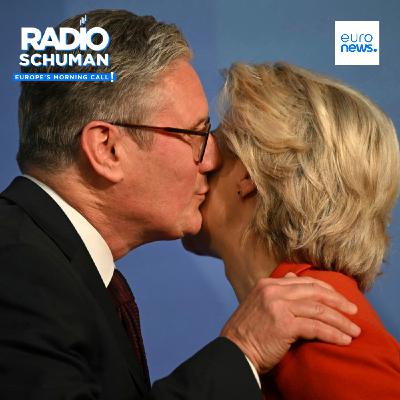Discover Radio Schuman
Radio Schuman

Radio Schuman
Author: Euronews
Subscribed: 21,503Played: 325,132Subscribe
Share
© Euronews
Description
This is Radio Schuman, your new go-to podcast to spice up your weekday mornings with relevant news, insights, and behind-the-scenes from Brussels and beyond.
Hosted on Acast. See acast.com/privacy for more information.
230 Episodes
Reverse
Brussels Commissioner for Brussels Alain Hutchinson, credited for building bridges between the EU and its capital, tells Radio Schuman how Brussels learned to embrace its position, how his office helps expats in the city and how Eurocrats have started to break out of their bubble.In this episode, we also look at a NATO Parliamentary Assembly in the US state of Ohio as the Trump administration casts doubt over US' defence of NATO allies in Europe. And finally, which countries in Europe are most inundated by counterfeit goods?Radio Schuman is hosted and produced by Lauren Walker. Audio editing by David Brodheim. Music by Alexandre Jas. Hosted on Acast. See acast.com/privacy for more information.
Radio Schuman speaks with water and drought expert Niko Wanders as many European countries are seeing record-low rainfall. How worrying is this and what is the impact? What can we expect if this weather continues? And what can ordinary citizens do to mitigate the worst-case scenarios?We also look at a meeting the European and African Union as the EU seeks closer ties. And finally, where do Western Europeans stand on developing nuclear weapons?This episode of Radio Schuman is hosted and produced by Lauren Walker. Audio editing by David Brodheim. Music by Alexandre Jas. Hosted on Acast. See acast.com/privacy for more information.
With its ReArm EU plan, the European Commission wants to prepare the EU for a US military withdrawal from the bloc. Radio Schuman asked Euronews reporter Alice Tidey whether it can move swiftly enough, whether the proposal has garnered wide-spread support, and about the next necessary steps.We also look at a meeting of EU foreign ministers in Brussels today, which could include a pivotal discussion on ties with Israel. Finally, where in Europe has the tax burden on workers increased, and decreased, the most?This episode of Radio Schuman is hosted and produced by Lauren Walker. Audio editing by David Brodheim. Music by Alexandre Jas. Hosted on Acast. See acast.com/privacy for more information.
A highly-anticipated EU-UK summit is taking place in London today, five years after Brexit. Radio Schuman spoke with Euronews correspondent Shona Murray to discuss why the meeting itself is extraordinary, what both parties have put on the table, and why they will likely come to an agreement on defence. This episode also looks at the European Humanitarian Forum in Brussels today as dark clouds hang over the future of Western aid. And finally, which popular European holiday destinations are most overrun by tourists?This episode of Radio Schuman is hosted and produced by Lauren Walker. Audio editing by David Brodheim. Music by Alexandre Jas. Hosted on Acast. See acast.com/privacy for more information.
Radio Schuman spoke with Euronews' Eurovision aficionado Gerardo Fortuna about this year's controversies and how organisers are working to ensure Eurovision doesn't become a political competition. This episode of Radio Schuman is hosted and produced by Lauren Walker. Audio editing by David Brodheim. Music by Alexandre Jas. Hosted on Acast. See acast.com/privacy for more information.
Radio Schuman talks with Euronews correspondent Sasha Vakulina, who has been following the whirlwind of events leading up to a possible meeting between the Russian and Ukrainian Presidents in Turkey on Thursday.What are the chances of such a face-to-face meeting, which would be a first since the full-blown Russian invasion started in 2022? Will Putin suffer backlash if he doesn't show face? And, how will US President Donald Trump's interference sway things?We’ll also look at today’s ruling in the infamous ‘Pfizergate’ case on secret text messages. And finally, will the EU ban phones at school?This episode of Radio Schuman is hosted and produced by Lauren Walker. Audio editing by David Brodheim. Music by Alexandre Jas. Hosted on Acast. See acast.com/privacy for more information.
Radio Schuman spoke with outgoing Brussels Mobility Minister Elke Van den Brandt about Brussels being without rule for almost a year, how this damages Brussels' reputation, and hurts locals. Why it is so difficult to come to an agreement? And will there be a re-election?We also head to the Western Balkans for the start of European Council President's four-day tour as part of diplomatic efforts to keep candidate countries on an EU path. And finally, Europe’s rapidly ageing population is posing an existential threat to the continent’s healthcare system. Which countries are worst affected?This episode of Radio Schuman is hosted and produced by Lauren Walker with journalist Maïa de la Baume. Audio editing by David Brodheim. Music by Alexandre Jas. Hosted on Acast. See acast.com/privacy for more information.
In an exclusive interview with Euronews, Ireland's Prime Minister Micheál Martin urged the European Union to crack down on what he calls Hungary's "abuse of vetoes". He discussed what tools could be used, Ukraine's accession to the bloc and Hungary's recent ban on public events by LGBTQ+ communities such as Pride.We also look at strategic talks between the Commission President Ursula von der Leyen and defence industry CEOs in Brussels. Finally, after decades of rapid development in digital literacy, the pace in Europe has slowed dramatically. Where is this situation most problematic?This episode of Radio Schuman is hosted and produced by Lauren Walker with journalist Maïa de la Baume. Audio editing by Johan Breton. Music by Alexandre Jas. Hosted on Acast. See acast.com/privacy for more information.
Radio Schuman spoke with Euronews’ Sasha Vakulina about what to expect from Russia’s Victory Day celebrations on Friday, the ceasefire disruptions, the European participants and what punishment they could risk for attending.In this episode, we also head to Nancy in France, where Poland and France are expected to deepen defence ties. Finally, looking for holiday inspiration? We look at the European beaches considered the best in the world.Radio Schuman is hosted and produced by Maïa de la Baume with journalist Lauren Walker. Audio editing by David Brodheim. Music by Alexandre Jas. Hosted on Acast. See acast.com/privacy for more information.
US President Donald Trump threatened to impose 100% tariffs on non-US films. Is the EU movie industry the latest political pawn in the EU-US trade war?In this episode, we also head to the Vatican for the start of the highly secretive Conclave. Finally, where in the EU do workers receive the highest pay?Radio Schuman is hosted and produced by Maïa de la Baume, with journalist and production assistant Lauren Walker. Audio editing by David Brodheim. Music by Alexandre Jas. Hosted on Acast. See acast.com/privacy for more information.
German lawmakers will gather in the Bundestag on Tuesday to elect Friedrich Merz as the country's new chancellor. In the run-up to this vote, we asked Berlin-based Euronews reporter Zara Riffler what Germans are expecting from their new leader, and how his focus may be elsewhere.We also look at high-level discussions on how to ensure sustainable supplies of raw materials, which form the basis of Europe’s economy. Finally, could Canada become the 28th EU member state?This episode of Radio Schuman is hosted and produced by Lauren Walker, with journalist Maïa de la Baume. Audio editing was by David Brondheim. Music by Alexandre Jas. Hosted on Acast. See acast.com/privacy for more information.
One month into the 90-day pause on reciprocal tariffs, can the EU and the US find common ground? And what happens if they don’t strike any deal? We put these questions and more to Sven Van Kerckhoven, professor of political economics at Brussels university VUB.We also head to Strasbourg for the European Parliament’s plenary sessions, which start today and will see MEPs discuss burning topics from just peace in Ukraine to the power outage in Spain and Portugal. And finally, we explore where in Europe workers pay the highest, and lowest, income tax.This episode of Radio Schuman is hosted and produced by Maïa de la Baume, with journalist and production assistant Lauren Walker. Audio editing was by Johan Breton. Music by Alexandre Jas. Hosted on Acast. See acast.com/privacy for more information.
Ahead of the Romanian presidential elections' re-run this Sunday, Radio Schuman spoke with Euronews’ Bucharest bureau chief Andra Miron-Diaconescu about how ultranationalist pro-Russian candidate Călin Georgescu, who won the first round of votes, vanished into thin air and who is the front-runner now.We also look at another meeting between the EU and India in Brussels as part of a bid to agree on a free-trade deal, and where in Europe readers buy the most books online.This episode is hosted and produced by Maïa de la Baume, with journalist and production assistant Lauren Walker. Audio editing by Johan Breton. Music by Alexandre Jas. Hosted on Acast. See acast.com/privacy for more information.
An unprecedented blackout brought much of Spain and Portugal to a standstill on Monday. Pending an official explanation of what caused the incident, we spoke with Euronews' senior energy and environment correspondent Robert Hodgson to understand what exactly went wrong. We also asked whether Europe could be hit by another, similar outage. What regions are most at risk? And can anything be done to prevent it from happening again?We will also look at a draft proposal signalling a reset of EU-UK relations following Brexit, which will be discussed by ambassadors in Brussels on Wednesday. And finally, which European cities are considered the most liveable?Radio Schuman is hosted and produced by Maïa de la Baume, with journalist and production assistant Lauren Walker. Audio editing by Georgios Leivaditis. Music by Alexandre Jas. Hosted on Acast. See acast.com/privacy for more information.
The conservative European People’s Party (EPP) is meeting in Valencia for the party's triennial congress. During this two-day event, Manfred Weber, who has been leading the EPP party since 2022 and the EPP group since 2014, is expected to be re-elected. What is behind Weber’s longevity at the helm of the EU’s most powerful political family? And as he is running unopposed, does this vote constitute unanimous support? Euronews' Sandor Zsiros travelled to Valencia to put these questions to Weber himself. Meanwhile, we spoke with our European Parliament reporter Vincenzo Genovese about how to interpret this result.We also look at a closed-door meeting of the EU Ministers for Environment and Climate, focusing on climate disinformation, and the top European countries for property investors in 2025.Radio Schuman is hosted and produced by Maïa de la Baume, with journalist and production assistant Lauren Walker. Audio editing by Georgios Leivaditis. Music by Alexandre Jas. Hosted on Acast. See acast.com/privacy for more information.
Euronews spoke with Frontex director Hans Leijten, discussing the importance of safeguarding fundamental rights, calls for the agency to suspend its mission with Greece and working with NGOs. What exactly is Frontex's role in border guarding? Should it do more to protecting migrants' lives?This episode also takes you to Poland, where the Three Seas Initiative Summit is starting, bringing together the leaders of 13 EU member states located between the Adriatic, Baltic and Black Seas, and their strategic partners. Finally, research shows that European leaders may be overestimating citizens' trust in new technologies.Radio Schuman is hosted and produced by Maïa de la Baume, with journalist and production assistant Lauren Walker. Audio editing by David Brodheim. Music by Alexandre Jas. Hosted on Acast. See acast.com/privacy for more information.
The European Commission on Wednesday revealed its highly anticipated penalties against US tech giants Apple and Meta. The decision comes at a time of spiralling trade tensions between the EU and the US government. The bloc is hoping to negotiate an end to this trade war, which could go far as threatening to hit US services such as Big Tech. But will the decision to fine Apple and Meta worsen the already deteriorating EU US relations?Today's Radio Schuman is hosted and produced by Lauren Walker, with journalist Maia de la Baume. Audio editing is by David Brodheim. Music by Alexandre Jas. Hosted on Acast. See acast.com/privacy for more information.
The EU's privacy watchdog Wojciech Wiewiórowski is responsible for ensuring the EU's institutions stick to their own data protection laws. What were the challenges he faced during his mandate? And how will geopolitical tensions impact the digital future?In an interview with Euronews, the European Data Protection Supervisor discussed how he is protecting EU data through investigations, legislative advices and, sometimes, corrective measures.Radio Schuman also takes you to London to discuss the bilateral meeting between Commissioner President Ursula von der Leyen and UK Prime Minister Keir Starmer, and looks at how climate change is affecting people's holiday plans. Today's Radio Schuman is hosted by Romane Armangau and produced by journalist and production assistant Lauren Walker, with audio editing by Johan Breton. Music by Alexandre Jas. Hosted on Acast. See acast.com/privacy for more information.
More and more EU countries are tightening their migration policies as governments are shifting more to the right. The focus in 2025 is on family reunification. Several countries including Finland, Germany and Belgium, have already hinted at or started making criteria stricter to make reunification less accessible. Austria has taken the boldest step so far, getting ready to temporarily halt family reunification - a first in the EU.Key politicians in the country justified the decision by arguing the country’s accommodation capacity had reached its limits and pointing to the country’s strained social services. Meanwhile, critics say this legally controversial move is a violation of common European asylum law and the European Convention on Human Rights.Radio Schuman spoke with Federica Toscano of the leading NGO Save the Children to dive into what the end of family reunification means for migrants and host countries. We also look at discussions on the next long-term EU budget and find out where in Europe people feel the loneliest.Radio Schuman is hosted and produced by Maïa de la Baume, with journalist and production assistant Lauren Walker, audio editing by David Brodheim. Music by Alexandre Jas. Hosted on Acast. See acast.com/privacy for more information.
The EU Commissioner Glenn Micallef shared with Euronews his concerns about potential budget cuts to Erasmus, following reports that some member states had proposed reductions in the 2025 annual budget.Although the budget was ultimately slightly increased, Micallef acknowledged ongoing discussions about the possible impact of the EU's shifting priorities—particularly toward defence and competitiveness—on future funding for cultural and youth initiatives like Erasmus in the 2028 long-term budget.The commissioner emphasized the EU's commitment to strengthening the Erasmus Plus Programme, highlighting its four-decade legacy of fostering European identity among millions of young people.Radio Schuman also brings you to key debates at the European Parliament as well as the situation of affordable housing in the EU.Radio Schuman is hosted and produced by Maïa de la Baume, with journalists and production assistants Eleonora Vasques and Lauren Walker, audio editing by David Brodheim. Music by Alexandre Jas. Hosted on Acast. See acast.com/privacy for more information.
 United States
United States




















g